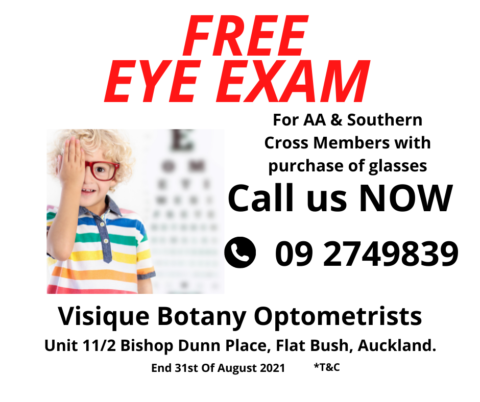| |
|
| |||
|
| |
Hi Everyone, I hope that you are all keeping well. The topic for this month's Educational Content Series relates to general wellbeing which is also good for eye health. As always, if you have any concerns we are able to discuss this with you during a scheduled appointment. You can book an appointment time on our website: click here Kind regards, David Lee Visique Botany Optometrists 09 274 9839 |
|
| |
|
| |
|
| |
Educational Content Series: Five everyday wellbeing tips that are also good for your eye healthBalancing work, a social life, relationships, looking after loved ones and getting eight hours of sleep is no easy task. As we struggle to prioritise our time, our health and wellbeing is typically the first thing to drop off, and more often than not our eye health is completely overlooked. With 90 per cent of vision loss avoidable or treated if detected early, it’s important we are looking after ourselves every day to avoid any nasty issues down the track. To help you maintain your wellbeing and good vision for life, we’ve collated five everyday wellbeing tips that are great for your overall health, and your eye health too. Eating a healthy dietAccording to Optometry Australia’s 2020 Vision Index, 70 per cent of people agree that a balanced diet can support eye health, and no, that doesn’t mean just eating carrots! Studies have indicated that consuming a healthy balanced diet reduces your risk of disease overall and helps to prevent eye problems or disease developing. Foods containing a range of vitamins and nutrients such as vitamin C, vitamin E and essential fatty acids are great contributors to overall wellbeing and eye health. Keeping hydratedHydration is a major contributor to wellbeing, promoting nourished skin and helping to deliver nutrients around the body. It is equally important for our eyes. Staying well hydrated helps your eyes to flush out toxins, helping to prevent conditions such as dry eye or floaters. To ensure you remain hydrated, you should aim to consume between eight to ten glasses of water per day. Reducing screen timeMost people believe too much screen time can impact their eyesight, with 78 per cent having experienced eye strain while using a computer, tablet or smartphone. Without regular blinking, which is typically what happens if you stare at screens for long periods, the chances of your eyes becoming strained, dehydrated and/or developing dry eye increases. It’s important we all take regular breaks from our screens and get outdoors. Not only is this good for our eye health, but for our overall wellbeing as fresh air, sunshine and time spent moving outdoors all contribute to mood regulation, nutrient intake and a healthy immune system. Taking makeup offTaking makeup off at night promotes clear skin and minimises the risk of eye infection. Conditions such as dry eye and conjunctivitis are often linked to poor makeup hygiene which is why it’s important makeup is removed at night and products are not used past their use-by date. By cleansing each night you’ll be able to sleep easy knowing your eyes aren’t at risk of infection, plus you’ll wake up fresh faced! Prioritising sleepSleep affects our overall wellbeing, appearance, mood and health, which is why it’s important we achieve at least seven to nine hours of rest per night. Ensuring you receive an appropriate night's sleep reduces the chances of developing physical symptoms such as dark circles, puffy eyes, or drooping eyelids – all signs of a poor night’s rest. Much like the rest of your body, your eyes heal themselves as you sleep. Not getting enough sleep can reduce this healing period and may contribute to:
Taking care of ourselves doesn’t have to be a pain. By practicing these five, easy wellbeing tips you can promote positive wellbeing and take care of your eye health too. Combine these everyday tips with a regular trip to the optometrist and you’ll have every chance of maintaining good vision for life. Sources: https://www.optometry.org.au/wp-content/uploads/GVFL/Year_2020/2020-Vision-Index-Report-FINAL.pdf |
|
| |
|
| |
| |
|
| |||
|


